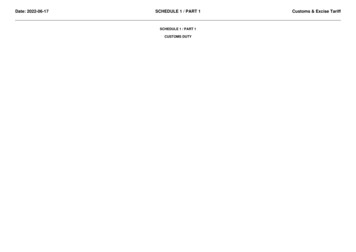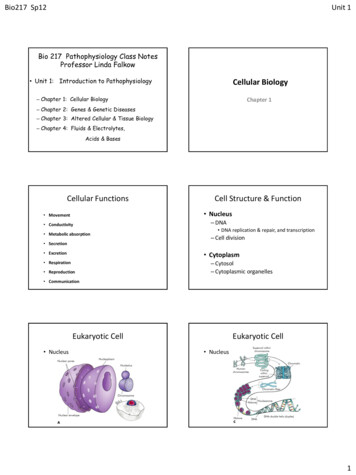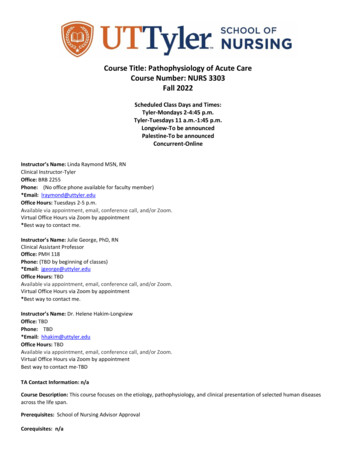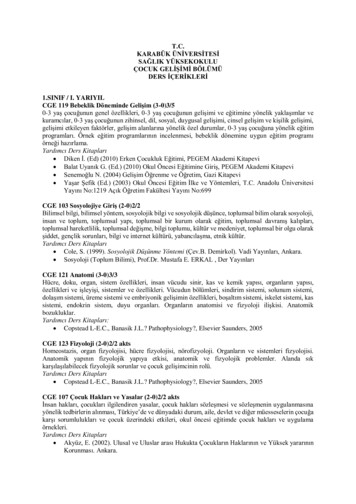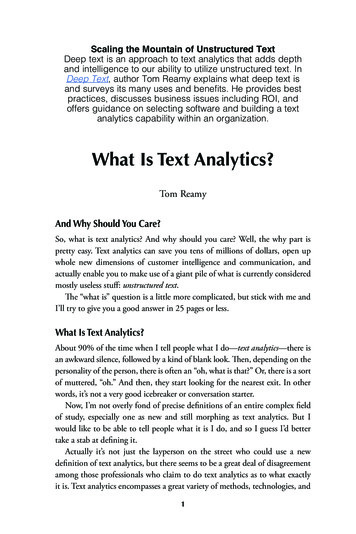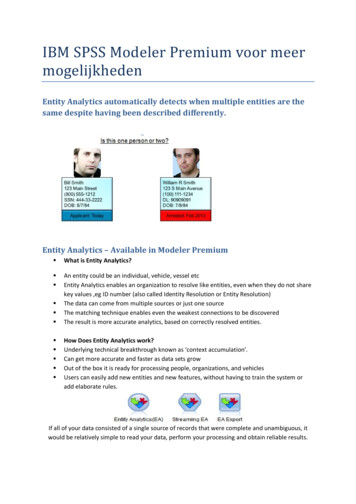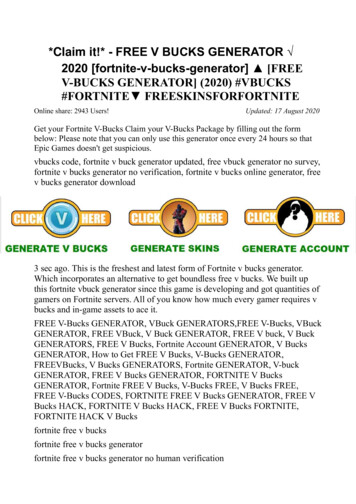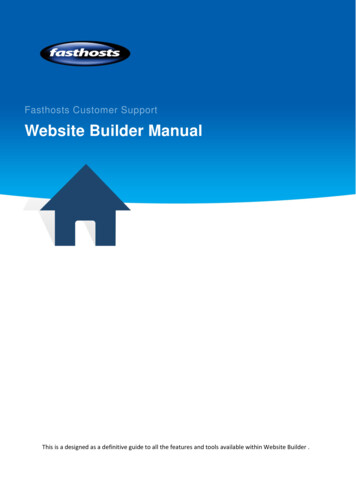
Transcription
Pathophysiology copstead free pdf download full text free
Pathophysiology copstead free pdf download full text freeLoading PreviewSorry, preview is currently unavailable. You can download the paper by clicking the button above. Table of contents : Cover.Page 1Title.Page 5Copyright.Page 6Preface.Page 11Brief Contents.Page 3Contents (chapter outlines with direct linking).Page 13Key Questions.Page 25Pathogenesis.Page 26TreatmentImplications.Page 27Statistical Normality.Page 28Cultural Considerations.Page 29Concepts of Epidemiology.Page 30Gender.Page 31Socioeconomic factors and lifestyle considerations.Page 32Primary prevention.Page 33Summary.Page 34Patterns of Disease and Epidemiology.Page 35Homeostasis.Page 36Stress as aConcept.Page 37Resistance or Adaptation Stage.Page 38Stressors, Gender and Developmental Influences, and Risk Factors.Page 40Catecholamines: Norepinephrine and Epinephrine.Page 41Adrenocortical Steroids: Cortisol and Aldosterone.Page 42Growth Hormone, Prolactin, and Oxytocin.Page 43Adaptation, Coping, andResilience.Page 44Allostatic Overload and Illness.Page 45Homeostasis and Allostasis.Page 47Neurohormones and Concepts of Stress.Page 48Adaptation and Coping.Page 49Key Questions.Page 50Lipid Bilayer.Page 51Membrane Proteins.Page 53Nucleus.Page 54Endoplasmic Reticulum.Page 55Golgi Apparatus.Page56Lysosomes and Peroxisomes.Page 57Cellular Metabolism.Page 58Oxidative Phosphorylation.Page 60Endocytosis and Exocytosis.Page 63Membrane Transport of Small Molecules.Page 64Sodium–potassium ion pump.Page 65Na -driven carriers.Page 66Passive transport carriers.Page 67Membrane ChannelProteins.Page 68Action Potential.Page 69Cell Signaling Strategies.Page 72Cell Surface Receptor–Mediated Responses.Page 73Intracellular Receptor–Mediated Responses.Page 77Regulation of Cellular Growth and Proliferation.Page 78Summary.Page 81Cell Growth Regulation.Page 82Reversible Cell Injury.Page83Intracellular Accumulations.Page 84Metaplasia.Page 87Necrosis.Page 88Apoptosis.Page 90Ischemia and Hypoxic Injury.Page 92Infectious and Immunologic Injury.Page 94Physical and Mechanical Injury.Page 96Cellular Basis of Aging.Page 98Somatic Death.Page 99Cellular Aging and Death.Page 100KeyQuestions.Page 101Structure of DNA.Page 102DNA Replication.Page 103Genetic Code.Page 104Transcription.Page 105Translation.Page 106Transcriptional Controls.Page 108Mechanisms of Development.Page 110Epithelial Tissue.Page 111Connective Tissue.Page 113Muscle Tissue.Page 114Nervous Tissue.Page115Summary.Page 116Differentiation of Tissues.Page 117Key Questions.Page 118Principles of Inheritance.Page 119DNA Mutation and Repair.Page 120Genetic Disorders.Page 122Aberrant Number of Chromosomes.Page 123Trisomy 21 (Down Syndrome).Page 124Klinefelter Syndrome.Page 125Mendelian Single-GeneDisorders.Page 126Marfan Syndrome.Page 127Autosomal-Recessive Disorders.Page 128Albinism.Page 129Sex-Linked (X-Linked) Disorders.Page 130Nonmendelian Single-Gene Disorders.Page 131Mitochondrial Gene Mutations.Page 133Polygenic and Multifactorial Disorders.Page 134Chemicals and Drugs.Page135Radiation.Page 136Prenatal Diagnosis and Counseling.Page 137Recombinant DNA Technology.Page 138Principles of Inheritance and Genetic Disorders.Page 139Key Questions.Page 141The Malignant Phenotype.Page 142Nutrition.Page 144Genetic Mechanisms of Cancer.Page 147Cytoplasmic Signaling Pathways.Page148From Proto-Oncogene to Oncogene.Page 149The Rb Gene.Page 151BRCA1 and BRCA2 Genes.Page 152Initiation.Page 153Progression.Page 155Patterns of Spread.Page 156Angiogenesis.Page 157Grading and Staging of Tumors.Page 158Effects of Cancer on the Body.Page 160Surgery.Page 161Gene and MolecularTherapy.Page 162Stem Cell Transplantation.Page 163Cancer Biology.Page 164Key Questions.Page 165Physical and Mechanical Barriers.Page 166Nutritional status.Page 167Bacterial Endotoxin.Page 168Antimicrobial Resistance.Page 169Transmission of Infection.Page 171Emerging Infectious Diseases.Page172Bacteria.Page 173Viruses.Page 174Fungi.Page 175Parasites.Page 176Emerging Infectious Diseases.Page 181Key Questions.Page 182Mononuclear Phagocyte System.Page 183Primary Lymphoid Organs.Page 184Lymph Nodes and Lymphatics.Page 185Neutrophils.Page 186Eosinophils.Page 187Monocytes andMacrophages.Page 188Lymphocytes.Page 189T Lymphocytes.Page 190Complement.Page 191Innate Defenses and Inflammation.Page 193Increased Vascular Permeability.Page 195Phagocytosis.Page 196Healing.Page 198Systemic Manifestations of Inflammation.Page 199Antigen Presentation by MHC.Page 200MHCClass II Presentation.Page 201T Helper Cells (CD4 ).Page 202Antigen Recognition by B Cells.Page 205Antibody Structure.Page 207Class Switching and Affinity Maturation.Page 209Antibody Functions.Page 210Active Immunity.Page 211Integrated Response to Microbial Antigen.Page 213Integrated Response to ViralAntigen.Page 215Regulation of Immune Function.Page 216Immunology.Page 217Key Questions.Page 218Autoimmunity.Page 219Environmental Triggers.Page 220Pharmacotherapies.Page 221Hypersensitivity.Page 222Pathogenesis.Page 223Treatment.Page 224Etiology and Pathogenesis.Page 225TransfusionReaction.Page 226Hemolytic Disease of the Newborn.Page 227Etiology.Page 228Pathogenesis.Page 229Treatment.Page 230Type IVa – Allergic Contact Dermatitis.Page 231Type IVd – Pustular Psoriasis.Page 233Etiology and pathogenesis.Page 234Clinical manifestations and treatment.Page 235SecondaryImmunodeficiency Disorders.Page 236Summary.Page 237Deficient Immune Responses.Page 238Classification of Hematologic Neoplasms.Page 239Etiology of Myeloid and Lymphoid Neoplasms.Page 240Diagnosis of Hematologic Neoplasms.Page 241Principles of Treatment.Page 242Prevention and Management ofComplications.Page 243Prognosis and treatment.Page 245Prognosis and treatment.Page 246Pathogenesis and clinical manifestations.Page 247Pathogenesis and clinical manifestations.Page 248Prognosis and treatment.Page 250Prognosis and treatment.Page 251Prognosis and treatment.Page 253MyeloidNeoplasms.Page 255Lymphoid Neoplasms.Page 256Key Questions.Page 257Types of HIV.Page 258Transmission.Page 260Prevention of Transmission.Page 262HIV Binding and Infection.Page 263Viral Production and Cell Death.Page 266Progression of HIV Infection From Seroconversion to AIDS.Page 268DiagnosticTesting.Page 269Monitoring the Progression of HIV.Page 270Systemic Manifestations.Page 272Pulmonary Manifestations.Page 273Mucocutaneous Manifestations.Page 274Gynecologic Manifestations.Page 275Neurologic Manifestations.Page 276Manifestations in Other Systems.Page 277Antiretroviral TherapyRecommendations.Page 278Nonnucleoside Reverse Transcriptase Inhibitors.Page 279HIV Epidemiology.Page 281Pathogenesis, Clinical Manifestations, and Management.Page 282Key Questions.Page 283Composition of Blood.Page 284Cellular Components.Page 285Structure and Function of Red Blood Cells.Page286Hematopoiesis.Page 287Hemoglobin Synthesis.Page 289Nutritional Requirements for Erythropoiesis.Page 290Red Cell Production.Page 291Oxygen Transport.Page 292Alterations in Oxygen Transport.Page 294General Effects of Anemia.Page 296Treatment.Page 301Course and prognosis.Page 302Etiology andpathogenesis.Page 303Course and prognosis.Page 304Treatment.Page 305Etiology and pathogenesis.Page 306Treatment.Page 307Neoantigen formation.Page 308Other Extrinsic Abnormalities.Page 309Clinical manifestations.Page 310Etiology and pathogenesis.Page 316Course and prognosis.Page317Summary.Page 318Anemias.Page 319Polycythemia.Page 321Stages of Hemostasis.Page 322Fibrin Clot.Page 323Clinical Assessment.Page 325Clinical manifestations.Page 328Pathogenesis.Page 330Diagnosis and treatment.Page 331Diagnosis and treatment.Page 332Diagnosis and treatment.Page333Pathogenesis.Page 334Coagulation Disorders.Page 335Key Questions.Page 337Vessel Structure.Page 339Anatomy of Capillaries.Page 340Hemodynamics of the Circulatory System.Page 341Blood Flow, Pressure, and Resistance.Page 342Velocity and Laminar and Turbulent Flow.Page 343Wall Tension andCompliance.Page 344Dynamics in the Microcirculation: Capillaries and Lymphatics.Page 345Intrinsic Mechanisms.Page 346Etiology.Page 347Clinical manifestations.Page 348Arteriovenous fistulas.Page 349Etiology and Pathogenesis.Page 350Modifiable risk factors.Page 351Nonmodifiable risk factors.Page353Classifications.Page 354Acute Arterial Occlusion.Page 355Clinical Manifestations and Treatment.Page 356Etiology and Pathogenesis.Page 357Summary.Page 358Venous and Lymphatic Disorders.Page 359Determinants of Systemic Blood Pressure.Page 361Components of Blood Pressure Measurement.Page 362IndirectMeasurement of Blood Pressure.Page 363Long-Term Regulation of Systemic Blood Pressure.Page 365Definition and Classification.Page 367Risk Factors.Page 368End-organ damage.Page 369Treatment Interventions.Page 370Secondary Hypertension.Page 372Hypertensive Emergencies and Urgency.Page 373Low BloodPressure.Page 374Measuring Blood Pressure and Definitions of Hypertension.Page 375Secondary Hypertension.Page 376Low Blood Pressure.Page 377Key Questions.Page 378Heart.Page 379Circulatory System.Page 380Cardiac Cycle.Page 382Isovolumic Contraction.Page 383Anatomy of the Coronary Vessels.Page384Regulation of Coronary Blood Flow.Page 385Structure of the Contractile Apparatus.Page 387Characteristics of Contractile Filaments.Page 389Sliding Filament/Cross-Bridge Theory of Muscle Contraction.Page 390Energy of Muscle Relaxation.Page 391Oxygen Utilization.Page 392Phase 0.Page 393Rhythmicity of MyocardialCells.Page 394Specialized Conduction System of the Heart.Page 395Electrocardiography.Page 396Determinants of Heart Rate.Page 398Contractile Capabilities of the Heart (Contractility).Page 399Electrocardiography.Page 400Echocardiography.Page 402Cardiac Catheterization/Coronary Angiography.Page403Resources.Page 405Key Questions.Page 406Risk Factors and Mechanisms of Coronary Atherosclerosis.Page 407Pathophysiology of Ischemia.Page 409Acute Coronary Syndrome.Page 412Diagnosis of MI.Page 413Electrocardiographic changes.Page 414Clinical course.Page 415Prognosis and treatment.Page416Chronic Ischemic Cardiomyopathy.Page 417Disorders of the Mitral Valve.Page 418Mitral Stenosis.Page 419Mitral Valve Prolapse.Page 420Aortic Regurgitation.Page 421Infective Endocarditis.Page 422Myocarditis.Page 423Hypertrophic Cardiomyopathy.Page 424Restrictive Cardiomyopathy.Page 425AcutePericarditis.Page 426Embryologic Development.Page 427Etiology and Incidence of Congenital Heart Disease.Page 428Pathophysiology of Congenital Heart Disease.Page 429Atrial Septal Defect.Page 430Patent Ductus Arteriosus.Page 431Transposition of the Great Arteries.Page 432Summary.Page 433Resources.Page434Key Questions.Page 435Diastolic Dysfunction With Preserved Ejection Fraction.Page 436Increased Preload.Page 437Myocardial Remodeling and Progression.Page 439Left-Sided Heart Failure.Page 441Right-Sided Heart Failure.Page 442Class and Stage of Heart Failure.Page 444Triggered Activity.Page445Reentry.Page 446Normal Sinus Rhythm.Page 447Sinus Arrest.Page 448Premature atrial complexes and tachycardia.Page 449Junctional Dysrhythmias.Page 450Ventricular fibrillation.Page 451Disturbances of Atrioventricular Conduction.Page 452Intraventricular Conduction Defects.Page 453Summary.Page 455HeartFailure.Page 456Dysrhythmias.Page 457Pathogenesis of Shock.Page 458Impaired Tissue Oxygenation.Page 459Compensatory Mechanisms and Stages of Shock.Page 461Etiology and Pathogenesis.Page 463Treatment.Page 464Treatment.Page 465Clinical Manifestations.Page 466Etiology and pathogenesis.Page467Pathogenesis.Page 468Clinical manifestations.Page 469Treatment.Page 470Arterial Oxygen Content.Page 471Hemodynamic Monitoring.Page 472Multiple Organ Dysfunction Syndrome.Page 473Septic Shock.Page 474Key Questions.Page 475Upper Airway Structures.Page 476Lower Airway Structures.Page477Age-Related Variations.Page 481Minute Ventilation.Page 484Airway Resistance.Page 485Neurologic Control of Ventilation.Page 486Ventilation–Perfusion Ratios.Page 489Barriers to Diffusion.Page 490Carbon Dioxide Transport.Page 491Hypoxemia and Hypoxia.Page 492Etiology.Page 493Treatment.Page494Pulmonary Function Testing.Page 495Clinical Manifestations.Page 496Etiology.Page 497Diagnosis.Page 498Pathogenesis.Page 499Summary.Page 500Pulmonary Malignancies.Page 501Key Questions.Page 502Etiology.Page 503Pathogenesis.Page 504Treatment.Page 505Etiology.Page 507Etiology.Page509Clinical Manifestations.Page 510Treatment.Page 511Etiology.Page 512Pathogenesis.Page 513Diagnosis.Page 514Pathogenesis.Page 515Treatment.Page 516Treatment.Page 517Pathogenesis.Page 518Treatment.Page 519Treatment.Page 520Cystic Fibrosis and Pulmonary Infections.Page 521KeyQuestions.Page 523Pathogenesis.Page 524Pathogenesis.Page 525Treatment.Page 526Pathogenesis.Page 527Etiology.Page 528Diagnosis.Page 529Treatment.Page 530Etiology.Page 531Etiology.Page 532Diagnosis.Page 533Clinical manifestations.Page 534Etiology.Page 535Pathogenesis.Page536Pathogenesis.Page 537Pathogenesis.Page 538Diagnosis.Page 539Etiology.Page 540Clinical manifestations.Page 541Summary.Page 542Pulmonary Infections.Page 543Key Questions.Page 545Fluid Intake and Absorption.Page 546Fluid Distribution.Page 547Fluid Loss Through Abnormal Routes.Page548Clinical manifestations.Page 549Hyponatremia.Page 550Etiology.Page 551Edema.Page 552Electrolyte Intake and Absorption.Page 553Plasma Potassium.Page 555Clinical manifestations.Page 556Hypercalcemia.Page 557Etiology.Page 558Etiology.Page 559Clinical manifestations.Page 560Summary.Page561Magnesium and Phosphate.Page 564Acid–Base Homeostasis.Page 565Respiratory Contribution.Page 566Renal Contribution.Page 567Compensatory response.Page 569Etiology.Page 570Etiology.Page 571Clinical manifestations.Page 572Summary.Page 573Resources.Page 574Key Questions.Page 575RenalLymphatics and Innervation.Page 576Renal Blood Supply.Page 577Overview of Nephron Structure and Function.Page 578Glomerulus.Page 579Proximal Convoluted Tubule.Page 581Loop of Henle.Page 582Collecting Duct.Page 583Physics of Filtration.Page 584Factors Affecting Filtration Pressure.Page 586Effects ofGlucose and Amino Acids.Page 587Role of Mesangial Cells.Page 588Regulation of Acid–Base Balance.Page 589Secretion of Potassium.Page 590Antidiuretic Hormone.Page 591Aldosterone, Angiotensin II, Natriuretic Peptides, Urodilatin, Uroguanylin, and Guanylin.Page 592Diuretic Agents.Page 593Urine and BloodStudies.Page 594Urinalysis.Page 595Intravenous Urography/Pyelography.Page 596Summary.Page 597Resources.Page 598Pain.Page 599Other Diagnostic Tests.Page 600Renal Agenesis and Hypoplasia.Page 601Autosomal-Dominant Polycystic Kidney Disease.Page 602Etiology and pathogenesis.Page 603Diagnosis andtreatment.Page 604Infection.Page 605Diagnosis and treatment.Page 606Obstruction.Page 607Etiology and pathogenesis.Page 608Diagnosis and treatment.Page 609Glomerular Disorders (Glomerulopathies).Page 610Glomerulonephritis.Page 611Acute Glomerulonephritis.Page 612Nephrotic Syndrome.Page 613FocalSegmental Glomerulosclerosis (FSGS).Page 614Pyelonephritis and Urinary Tract Infection.Page 615Glomerulopathy.Page 616Acute Kidney Injury.Page 617Prerenal Kidney Injury.Page 618Intrinsic/Intrarenal Kidney Injury.Page 619Clinical Presentation of Acute Kidney Injury.Page 620Oliguric Phase.Page 623PostoliguricPhase.Page 624Risk Factors.Page 625Complications of Chronic Kidney Disease.Page 626Pain.Page 627Chronic Kidney Disease.Page 628Pain.Page 629Kidney Transplant.Page 630Chronic Kidney Disease.Page 631Acute Kidney Injury.Page 632Functional Anatomy.Page 633Mechanism of Micturition.Page634Pathogenesis.Page 635Treatment.Page 636Bladder Pain Syndrome/Interstitial Cystitis.Page 637Neurogenic Bladder.Page 638Diagnosis and clinical manifestations.Page 639Ureterocele.Page 640Risk factors.Page 641Treatment.Page 642Cystitis.Page 643Diagnosis and treatment.Page 644Summary.Page646Bladder Pain, Dysfunction and Congenital Anomaly.Page 647Urinary Tract Infections.Page 648Urinary Stones.Page 649Upper Genitourinary Tract.Page 650Bladder.Page 651Prostate.Page 652Testes.Page 653Epididymis and Ductus Deferens.Page 654Penis.Page 655Nephric System.Page 656Hypothalamic-PituitaryTesticular Axis.Page 657Transport of Spermatozoa.Page 661Acrosome Reaction.Page 663Resources.Page 664Micropenis.Page 665Etiology and treatment.Page 666Etiology and treatment.Page 667Etiology.Page 668Infectious Disorders.Page 669Cryptorchidism.Page 671Treatment.Page 672Diagnosis andtreatment.Page 673Treatment.Page 674Treatment.Page 675Prostate Cancer.Page 676Diagnosis.Page 677Treatment.Page 678Resources.Page 679Organization of the Female Reproductive Organs.Page 680Ovaries.Page 681External Genitalia.Page 682Menstrual Cycle.Page 683Breast Development.Page686Fetal Membranes and Placenta.Page 687First Month.Page 688Hormonal Changes.Page 689Changes in the Circulatory System.Page 691Menopause.Page 692Summary.Page 693Menopause.Page 694Key Questions.Page 695Etiology and pathogenesis.Page 696Treatment.Page 697Clinical manifestations.Page698Clinical manifestations and treatment.Page 699Etiology.Page 700Clinical manifestations and treatment.Page 701Clinical manifestations and treatment.Page 702Etiology.Page 703Clinical manifestations and treatment.Page 704Clinical manifestations and treatment.Page 705Fat Necrosis.Page 706Specific BenignNeoplasms.Page 707Clinical manifestations.Page 708Treatment.Page 709Summary.Page 710Disorders of Pregnancy.Page 711Disorders of the Breast.Page 712Key Questions.Page 713Etiology and clinical manifestations.Page 714Pathogenesis.Page 715Herpesvirus Infections.Page 716Treatment.Page717Pathogenesis and clinical manifestations.Page 718Summary.Page 719Resources.Page 720Key Questions.Page 721Embryology.Page 722Oral Cavity and Pharynx.Page 723Stomach.Page 724Small Intestine.Page 725Large Intestine.Page 727Neural Control.Page 728Electrical Activity of Gastrointestinal SmoothMuscle.Page 729Propulsive Movements.Page 730Swallowing.Page 731Regulation of gastric emptying.Page 732Control of motility.Page 733Defecation.Page 734Regulation of colonic motility.Page 735Digestion and Absorption.Page 736Digestion of Lipids.Page 737Digestion of Proteins.Page 738Water andElectrolytes.Page 739Age-Related Changes.Page 741Summary.Page 742Resources.Page 743Key Questions.Page 744Abdominal Pain.Page 745Pathophysiologic mechanisms.Page 747Treatment.Page 748Esophageal Varices.Page 749Etiology and pathogenesis.Page 750Inflammatory Bowel Disease.Page752Treatment.Page 753Clinical manifestations.Page 754Etiology.Page 755Clinical manifestations and treatment.Page 756Clinical manifestations and treatment.Page 757Hirschsprung Disease.Page 758Etiology.Page 759Treatment.Page 760Clinical manifestations and treatment.Page 761Etiology and riskfactors.Page 762Stress of Lifestyle Changes.Page 763Disorders of Stomach and Intestinal Wall.Page 764Cancers of the GI Tract.Page 765Structure and Function of the Pancreaticobiliary System.Page 766Physiology of Bile.Page 767Pathophysiology of Cholesterol Gallstone Formation.Page 768Cholelithiasis andCholecystitis.Page 769Clinical manifestations.Page 770Diagnosis.Page 771Etiology and pathogenesis.Page 772Treatment.Page 773Etiology and pathogenesis.Page 774Treatment.Page 775Pancreatic Cancer.Page 776Pancreatitis.Page 777Key Questions.Page 778Etiology and pathogenesis.Page779Hepatic.Page 780Diagnostic tests.Page 782Portal Hypertension.Page 783Treatment.Page 784Treatment.Page 787Etiology, pathogenesis, and clinical manifestations.Page 788Treatment.Page 789Prognosis and treatment.Page 790Pathogenesis and clinical manifestations.Page 791Diagnosis.Page792Prevention.Page 793Treatment.Page 795Management of autoimmune hepatitis.Page 796Diagnosis and treatment.Page 797Treatment.Page 798Pathogenesis, clinical manifestations, and diagnosis.Page 799Transplantation.Page 800Posttransplantation Management.Page 801Infectious and Acquired Hepatitides inChildren.Page 802Disorders of Bilirubin Metabolism.Page 803Liver Diseases and Geriatric Considerations.Page 804Viral Hepatitis.Page 805Liver Disease in Children.Page 806Key Questions.Page 807G-Protein–Coupled Receptors.Page 808Protein Kinase Receptors.Page 809Hormone Synthesis, Secretion, andMetabolism.Page 810Receptor Down-Regulation and Up-Regulation.Page 811Hormones of the Posterior Pituitary Gland.Page 812Antidiuretic Hormone.Page 813Growth Hormone.Page 814Gonadotropins.Page 816Thyroid Action on Target Cells.Page 817Steroid Hormone Synthesis and Secretion.Page 818Steroid Action onTarget Cells.Page 819Hyporesponsiveness.Page 821Hypothalamic-Pituitary System, Thyroid and Adrenal Glands.Page 822Etiology of Endocrine Disorders.Page 823Classification of Endocrine Disorders.Page 824Etiology and pathogenesis.Page 825Treatment.Page 826Clinical manifestations.Page 827Etiology andpathogenesis.Page 828Treatment.Page 829Clinical manifestations.Page 830Diagnosis.Page 831Clinical manifestations.Page 832Hyperaldosteronism.Page 833Etiology and pathogenesis.Page 834Etiology and pathogenesis.Page 835Etiology and pathogenesis.Page 836Etiology and pathogenesis.Page837Resources.Page 838Key Questions.Page 839Hormonal Regulation.Page 840Neural Regulation.Page 841Stress.Page 842Impaired Glucose Tolerance and Impaired Fasting Glucose Tolerance.Page 844Etiology.Page 845Pathogenesis and clinical manifestations.Page 846Pathogenesis and clinical manifestations.Page847Screening for Diabetes.Page 848Diabetic Ketoacidosis.Page 849Microvascular Complications.Page 850Treatment and Education.Page 851Obesity and Eating Disorders.Page 852Oral Antidiabetic Agents.Page 853Insulin.Page 854Assessment of Efficacy.Page 855Pediatric Considerations.Page 857GeriatricConsiderations.Page 858Treatment.Page 859Diabetes Management and Outcomes.Page 860Metabolic Processes.Page 862Carbohydrates.Page 863Lipids.Page 864Role of Genetics, Epigenetics, and Environment.Page 865Hormonal Regulation of Nutrient Intake and Appetite.Page 866Cortisol.Page 867Metabolic Responsesto Starvation and Physiologic Stress.Page 868Physiologic Stress.Page 869Infection, Sepsis, and Fever.Page 870Immobility.Page 872Resources.Page 873Key Questions.Page 874Support and Protection of the Central Nervous System.Page 875Cerebrum.Page 877Diencephalon.Page 880Brainstem.Page 884The SpinalCord.Page 885Cranial Nerves.Page 887Spinal Nerves.Page 888Autonomic Nervous System.Page 891Glia.Page 892Membrane Potentials.Page 896Synaptic Transmission.Page 898Neurotransmitters.Page 899Development.Page 904Injury.Page 905Sensory Receptors.Page 906Motor Function.Page 907SpinalReflexes.Page 908Central Control of Motor Function.Page 909Consciousness and Memory.Page 910Sleep.Page 912Resources.Page 914Key Questions.Page 915Cellular Energy Failure.Page 916Excitatory Amino Acids.Page 917Reperfusion Injury.Page 918Etiology.Page 919Brain Compression and Herniation.Page921Management.Page 923Glasgow Coma Scale.Page 924Pupil Reflex.Page 925Epidemiology.Page 926Epidural Hematoma.Page 927Subdural Hematoma.Page 928Cerebrovascular Disease and Stroke.Page 929Treatment.Page 930Cognitive Deficits.Page 932Etiology.Page 933Treatment.Page 934Treatment.Page935Pathogenesis and Manifestations.Page 936Traumatic Brain Injury.Page 937Brain Infections.Page 938Key Questions.Page 939Generalized seizures.Page 940Diagnosis and Treatment.Page 941Pathogenesis.Page 942Etiology.Page 944Clinical Manifestations and Treatment.Page 945Clinical Manifestations.Page946Etiology.Page 947Etiology and Clinical Manifestations.Page 948Clinical Manifestations and Treatment.Page 949Treatment.Page 951Spinal Cord Injury.Page 952Pathogenesis.Page 953Clinical Manifestations and Treatment.Page 955Clinical Manifestations and Treatment.Page 956Dementia and Alzheimers Disease.Page957Spinal Cord and Peripheral Nervous System.Page 958Key Questions.Page 960Inner Ear.Page 961General Manifestations of Hearing Impairment.Page 962Etiology.Page 963Diagnosis and treatment.Page 964Acute Otitis Media.Page 965Structure of the Eye.Page 966Visual Pathways.Page 967Myopia, Hyperopia,Presbyopia, and Astigmatism.Page 968Amblyopia.Page 969Etiology and pathogenesis.Page 971Diagnosis and treatment.Page 972Interventions for Individuals With Vision Impairment.Page 974Diagnosis and treatment.Page 976Hearing.Page 977Smell and Taste.Page 978Physiology of Pain.Page 979Transmission.Page980Modulation.Page 982Types of Pain.Page 984Acute Pain.Page 985Chronic Pain.Page 986Diagnosis and Treatment.Page 987Neuropathic Pain.Page 988Clinical Manifestations.Page 989Referred Pain.Page 990Pharmacologic and Nonpharmacologic Pain Management.Page 991Altering the Perception and Integration ofPain.Page 992Pain Syndromes.Page 993Age Considerations.Page 994Key Questions.Page 995Dopamine effects.Page 996GABAergic interneuron origin.Page 997Marijuana use in adolescents and schizophrenia.Page 998Neurologic effects.Page 999Pharmacologic Treatment.Page 1000Nonpharmacologic Treatment.Page1001Major Depressive and Persistent Depressive Disorders.Page 1002Etiology and Neurobiology.Page 1003Clinical Manifestations.Page 1004Nonpharmacologic Treatment.Page 1005Etiology and Neurobiology.Page 1006Pharmacologic Treatment.Page 1007Geriatric Considerations.Page 1008Schizophrenia.Page 1010BipolarDisorder.Page 1011Anxiety Disorders.Page 1013Etiology and Neurobiology.Page 1014Etiology and Neurobiology.Page 1015Etiology and Neurobiology.Page 1016Treatment.Page 1017Clinical Manifestations.Page 1018Neurodevelopmental Disorders.Page 1019Pharmacologic Treatment.Page 1020Treatment.Page1021Obsessive-Compulsive Disorder.Page 1022Attention Deficit Hyperactivity.Page 1023Autism.Page 1024Key Questions.Page 1025Composition.Page 1026Continuous Growth.Page 1027Response to Injury, Stress, and Aging.Page 1028Str
Pathophysiology copstead free pdf download full text free Loading PreviewSorry, preview is currently unavailable. You can download the paper by clicking the button above.


